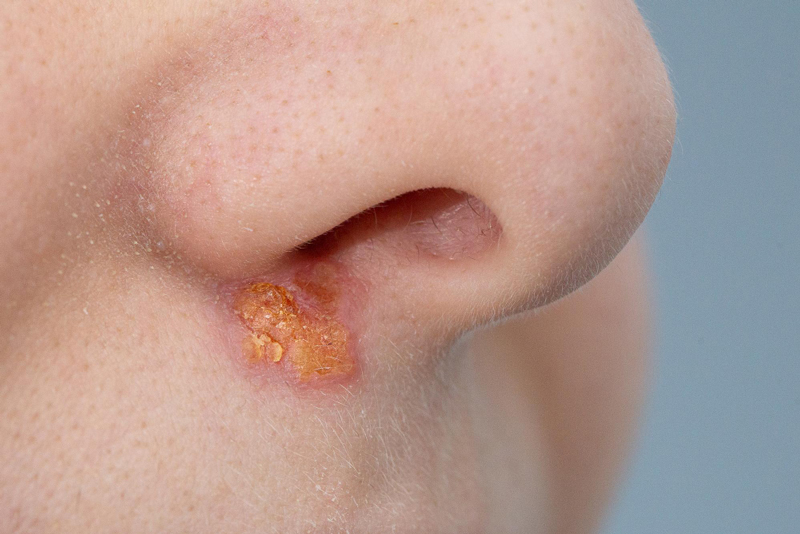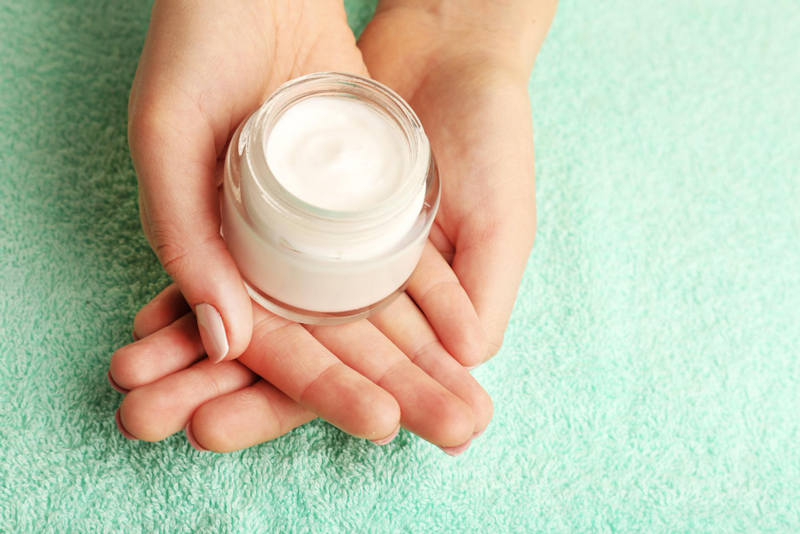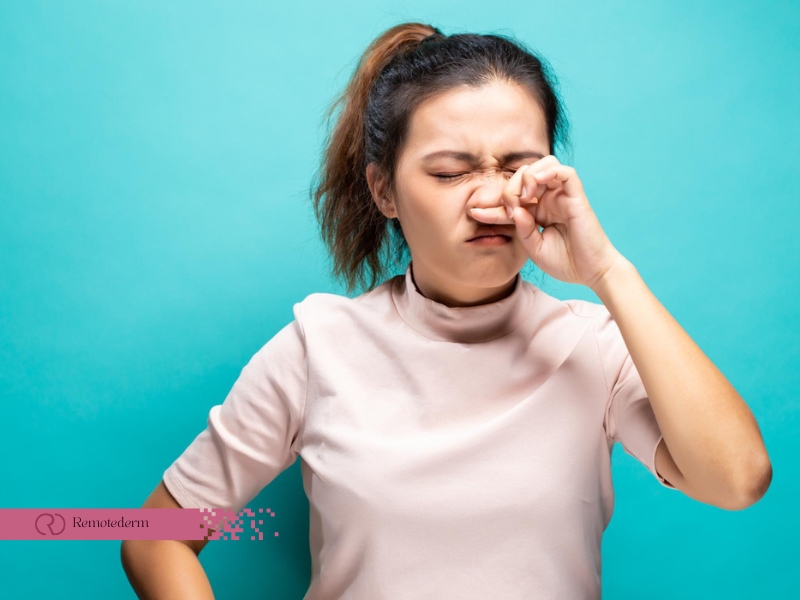Cold sore in the nose, particularly fever blisters, have been proven to be the most excruciating of all symptoms of cold sores. This article will consider the causes and triggers behind nasal cold sores, mainly under the influence of herpes simplex virus type 1, and then give you an insight into some of the effective treatments and ways through which it can be prevented, including options available in Canada. By understanding these factors, you will be able to manage symptoms and cut down on frequency, ensuring a more comfortable and informed approach toward dealing with this common condition.
What Are Cold Sores?
Cold sores are caused by the herpes simplex virus (HSV) and are inclined to be small blisters. They mainly appear around the lips but can occasionally be found inside people’s noses. These blisters can be painful, itchy, and somewhat embarrassing. Cold sores are most contagious and spread through close contact, such as kissing and utensil sharing.
Can You Get Cold Sores in the Nose?
Yes. Cold sores can be obtained inside the nose. The virus that usually causes cold sores can infect the mucous membranes inside the nose, which eventually results in painful blisters. This area is vulnerable, and cold sores in the nose are quite uncomfortable.

What Causes Cold Sores in the Nose?
Cold sores are caused by the herpes simplex virus type 1. Following the initial infection, the virus remains latent in the nerve cells of the human body. Some triggers can activate the virus, resulting in sores.
Common Triggers
Many factors that reactivate the herpes simplex virus are likely to lead to cold sores in the nose. By understanding these triggering factors, you can regulate and prevent outbreaks.
- Stress: High stress levels tend to weaken the immune system, and this offers a ground for the virus to reactivate.
- Illness: The development of cold sores occurs when a cold, the flu, or any other kind of infection weaken your immune system.
- Sun Exposure: The sun’s ultraviolet (UV) rays can cause cold sores in some people. Even in winter in Canada, UV exposure can be significant, mainly when reflected in snow.
- Hormonal Changes: The hormonal changes in women can contribute to facial outbreaks, particularly those that occur during menstruation.
- Injury or Trauma: At times, facial or nasal injury can precipitate the outbreak.
Symptoms of Cold Sores in the Nose
Cold sores in the nose can cause various painful symptoms, such as:
- Pain or itching inside the nose: The leading indicator is usually a tingle or itch.
- Red, inflamed blisters: Such lesions can be painful and disturbing.
- Swelling and tenderness around the nostrils: Swelling and sensitivity will appear around the area.
- Crusty sores as the blisters heal: As the cold sores begin to dry and cure, they almost always result, for some time, in crusty sores, which can be pretty unattractive and annoying.
How to Treat Cold Sores in the Nose
Some valuable treatment options for the cold sore in the nose include over the counter, home remedies, and prescription medications, among others.
Over-the-Counter Remedies
Many over-the-counter preparations help reduce symptoms or duration of cold sores. Some beneficial treatments include antiviral creams, painkillers, and local anesthetics.
- Antiviral Creams: Some products contain either acyclovir or penciclovir, which are necessary for decreasing the duration and seriousness of outbreaks.
- Pain Relievers: This involves the use of Acetaminophen or Ibuprofen, which will help in the reduction of inflammation and pain.
- Topical Anesthetics: Examples include lidocaine or benzocaine creams, which desensitize the affected area and reduce itching and discomfort.

Home Remedies
In addition to over-the-counter treatment, home remedies can offer relief and also aid the healing process.
- Cold Compresses: Holding a cold and wet cloth in the bruised area may help reduce the swelling and numb the pain.
- Aloe Vera Gel: Well known for its excellent effect, which helps quickly heal blisters.
- Honey: Believed to have antiviral and antibiotic properties to help in an easy recovery.
Prescription Medications
If the outbreaks are more severe or more frequent, prescription pills may be needed to relieve symptoms adequately.
- Antiviral Pills: For those individuals who have terrible outbreaks or widespread outbreaks, an antiviral medication containing either valacyclovir or famciclovir can be obtained by prescription from a doctor. Both are easily obtainable in Canada by prescription from one’s doctor.
- Preventive Therapy: For those individuals plagued by frequent outbreaks, a daily antiviral medication can be taken to reduce the number of outbreaks in the future. The Canadian healthcare systems support this, making preventive therapy options more available to the residents in Canada, which makes their task more straightforward to follow and reduces the frequency of the outbreaks of cold sores.
How to Prevent Cold Sores in the Nose?
Preventing cold sores includes staying away from triggers and going a step further to reduce the spread of the virus.
Tips for Prevention
Several lifestyle changes and precautions can reduce the possibility of such cold sore outbursts.
- Relieve Stress: Exercise related to meditation, exercising, or deep breathing exercises.
- Boost Your Immune System: Eat right, exercise often, and have enough sleep to make your immunity strong.
- Protect Your Skin: Consider using a lip balm with SPF.
- Avoid Close Contact: Refrain from kissing or sharing utensils with anyone with an active cold sore.
How to Hide Cold Sores
Though it is better to let cold sores heal on their own, knowing how to hide cold sores can make life a lot better. Sores that are visible around the nose can be covered up using a nonirritating concealer. One should also guard against scratching since doing so might cause scarring and delay healing.
Final Thoughts
Cold sores in the nose are an uncomfortable but controllable condition. Being able to understand what causes the cold sores in the nose, what your triggers are, and ways of treating them is a manner in which one can stay ahead of these outbreaks. Taking action concerning the prevention and the effectiveness of treatment will lessen the frequency and severity of cold sores and lead to comfortable living.
FAQs
1. Can you get complications from nose cold sores?
Yes, if left untreated, cold sores can indeed cause bacterial infections, or they might spread to other areas of the face. This may ultimately require the use of antibiotics to control the secondary infection.
2. Are cold sores in the nose contagious?
Yes, cold sores are easily spread through saliva or direct contact with the sores. To prevent the spread of the virus during an outbreak:.
3. Are cold sores in the nose different from those on the lips?
The herpes simplex virus causes both cold sores in the nose and on the lips, but those in the nose are the most painful as they occur in the mucous membranes lining the inside of the nose.
4. How long does it take for a nose sore to heal?
Generally, the cold sores last 7-10 days, but the survival period could be diminished if antiviral treatments are applied. Good care and treatment can reduce the intensity and time of an outbreak.
